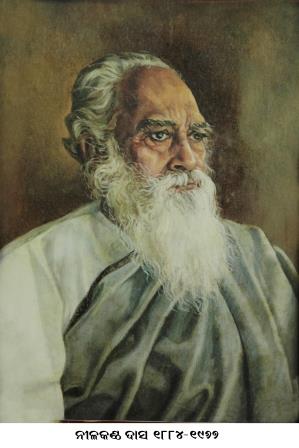Born :- 05-Aug-1884
Died :- 06-Nov-1967
Place of Birth :- Sakhigopal, Puri

Nilakantha Das was a multifaceted personality—a brilliant scholar, a dedicated social reformer, a voracious reader, an accomplished statesman, an eminent educationist, a freedom fighter and a writer. He appeared on the political and literary scene of Odisha at a crucial time when Odisha had no definite political identity and Odia as a language was about to vanish. Nilakantha was one of the most striking political figures in the pre- and post-Independence era. He was one of the pioneers of the Satyabadi Bana Bidyalaya which ushered a new era in Education in the history of Odisha.
Nilakantha Das was born on 5 August, 1884 in a respectable Brahmin family of Sriramchandrapur Sasan, near Sakhigopal in Puri district. His father’s name was Ananda Das. Mother Heera Devi was a deeply pious lady. He progressed brilliantly well in his academic career till he became an M.A. in Philosophy from the Calcutta University.
After his studies, Nilakantha Das started his career as Principal of the Satyabadi Bana Bidyalaya, pioneered by Gopabandhu Das, Acharya Harihar and himself, in the year 1911 and worked hard to make it a centre of excellence. It was under his inspiration that the scheduled caste students could stay with the Brahmin boys in the same hostel and dined in the same room.
On the invitation of Sir Ashutosh Mukharjee, the then Vice-Chancellor of Calcutta University, Nilakantha Das joined the University as a lecturer in Odia but only for three months. Further, the Viceroy of India, who was the Chancellor of Delhi University, nominated him as a member of the Senate where he served until 1930. His contribution towards establishment of Utkal University is praiseworthy. He was nominated Pro-Chancellor of Utkal in 1955 and remained as such till 1962.
Under the influence of Mahatma Gandhi, Pandit Nilakantha joined the Freedom Movement in 1921. He was sent to jail four times between 1922 and 1933 for participating in the Freedom Movement. Due to his close association with central leaders as well as his popularity in the state he was elected President of Utkal Provincial Congress Committee in 1934 and remained its uncontested chief for five years. In December 1935, he was elected to the Central Legislative Assembly. Though the Congress won in the state Assembly election in 1937 under his leadership, Biswanath Das became Prime Minister instead of Nilakantha Das due to conspiracy by a top leader of the state even though Nilakantha enjoyed support of 21 members out of 36 in the party. In 1939 he was defeated by Harekrushna Mahtab in the election of party president. Then Nilakantha formed a separate party called ‘Independent Janasangha’ during the 1951 election and got elected with some followers to the State Legislative Assembly where he proved himself to be an outstanding member in the opposition. Persuaded by Nehru in 1955, he joined the party again and from 1957 to 1961, he occupied the position of Speaker in the State Assembly. Unfortunately, he was not given a ticket by the Congress Party for the 1961 election. He retired from politics in 1961.
Pandit Nilakantha was a versatile scholar as well as a writer. His book ‘Odia Sahityara Krama Parinam’ is a critical study on the development of Odia literature and culture in a very unique and outstanding manner. His autobiography won him the Kendra Sahitya Academy Award in 1963. His well-known works on Poetry are: Konarke, Kharavela, Pranayini and Dasanayak. His contributions on children’s literature are also worth-mentioning. His Bhaktigatha was popular among school and college students at that time. Besides, he has written ‘Pilanka Ramayana’, Pilanka Mahabharata and Pilanka Bhagabata for children. One of his popular Odia books, Arjya Jeevan, was translated in 1926 by the eminent Hindi writer Jainendra Kumar. He is considered one of the earliest linguists of contemporary Odia language. He also did journalism and edited the famous ‘Naba Bharat’ from 1933 to 1945. He also edited ‘Seva’ and ‘Lokamata’.
In recognition of his literary achievements, the Utkal University conferred on him D. Litt (Honoris Causa) in 1955. In 1957, the he was honoured with the ‘Padma Bhusan’ by the Union government. He was the first President of the Orissa Sahitya Academy in 1958. A great scholar and a great patriot,Pandit Nilakantha Das passed away on 6 November, 1967.
